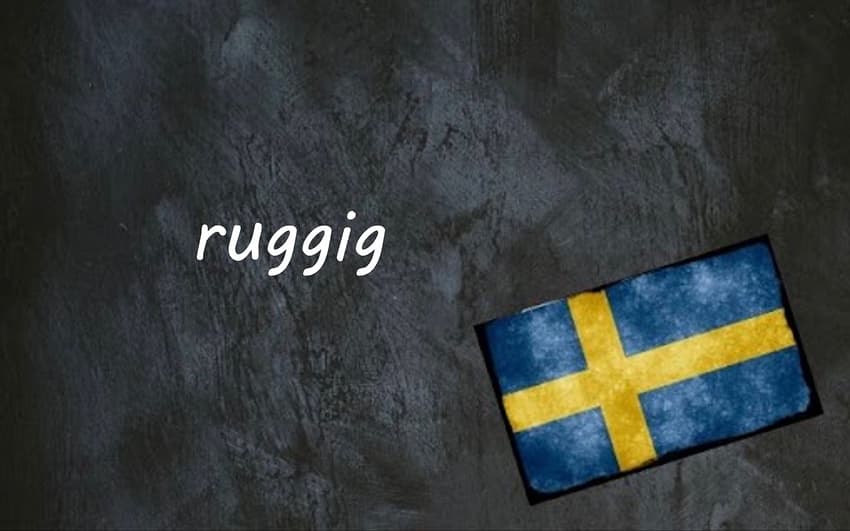Swedish word of the day: ruggig

As summer rainstorms sweep over much of Sweden, this is a useful word to have in your arsenal. But it is also a satisfyingly expressive word for almost any bleak, rough or forlorn situation or thing.
The word ruggig describes the sort of damp, grey day when the cold or rain really gets into your bones. In summer or autumn, there might be a chilling wind or drizzle (duggregn), and there will be little in the way of sunshine, while in winter it probably refers to slushy rain but no actual snow.
It roughly translates as "bleak" or "shivery", and is more or less interchangeable with the word ruskig (although ruskig implies more rain).
- READ ALSO: How to talk about the weather with Swedes
A Swede might say, "det är lite ruggigt ute" (It's a bit bleak out today), when explaining a decision to forgo their morning run, or cancel a planned walk with friends.
It is perhaps most often used to justify spending the entire day inside doing not very much: "När det är såhär ruggigt ute finns det väl inget bättre än att tända lite ljus och bara mysa i soffan?" (When it's this bleak outside, what could be better than lighting a few candles and just chilling out on the sofa?).
But ruggig can also be used to describe other situations or things that are harsh, unpleasant, or raw.
A thriller novel or crime series which is not for the squeamish can be ruggig. A book on the prevalence of sexual violence might be ruggigt viktiga (hard-hitting and important), and discomforting statistics on the decline of pupils' academic attainment might be described as ruggig och otäck "bleak and unpleasant".
A person can also be described as ruggig if they are rough, unpleasant and scary. "Usch, vilken ruggig människa!" a Swede might exclaim, in a similar way to that you might use "rough" in English.
Ruggig can also describe how you feel when you are ill, when it includes a sense of shivering.
"Jag kände mig ruggig, frusen och hade en allmän sjukdomskänsla. ("I felt rough and shivery, frozen, and had a general feeling of being ill").
Don’t miss any of our Swedish words and expressions of the day by downloading our new app (available on Apple and Android) and then selecting the Swedish Word of the Day in your Notification options via the User button.
Comments (1)
See Also
The word ruggig describes the sort of damp, grey day when the cold or rain really gets into your bones. In summer or autumn, there might be a chilling wind or drizzle (duggregn), and there will be little in the way of sunshine, while in winter it probably refers to slushy rain but no actual snow.
It roughly translates as "bleak" or "shivery", and is more or less interchangeable with the word ruskig (although ruskig implies more rain).
- READ ALSO: How to talk about the weather with Swedes
A Swede might say, "det är lite ruggigt ute" (It's a bit bleak out today), when explaining a decision to forgo their morning run, or cancel a planned walk with friends.
It is perhaps most often used to justify spending the entire day inside doing not very much: "När det är såhär ruggigt ute finns det väl inget bättre än att tända lite ljus och bara mysa i soffan?" (When it's this bleak outside, what could be better than lighting a few candles and just chilling out on the sofa?).
But ruggig can also be used to describe other situations or things that are harsh, unpleasant, or raw.
A thriller novel or crime series which is not for the squeamish can be ruggig. A book on the prevalence of sexual violence might be ruggigt viktiga (hard-hitting and important), and discomforting statistics on the decline of pupils' academic attainment might be described as ruggig och otäck "bleak and unpleasant".
A person can also be described as ruggig if they are rough, unpleasant and scary. "Usch, vilken ruggig människa!" a Swede might exclaim, in a similar way to that you might use "rough" in English.
Ruggig can also describe how you feel when you are ill, when it includes a sense of shivering.
"Jag kände mig ruggig, frusen och hade en allmän sjukdomskänsla. ("I felt rough and shivery, frozen, and had a general feeling of being ill").
Don’t miss any of our Swedish words and expressions of the day by downloading our new app (available on Apple and Android) and then selecting the Swedish Word of the Day in your Notification options via the User button.
Join the conversation in our comments section below. Share your own views and experience and if you have a question or suggestion for our journalists then email us at [email protected].
Please keep comments civil, constructive and on topic – and make sure to read our terms of use before getting involved.
Please log in here to leave a comment.